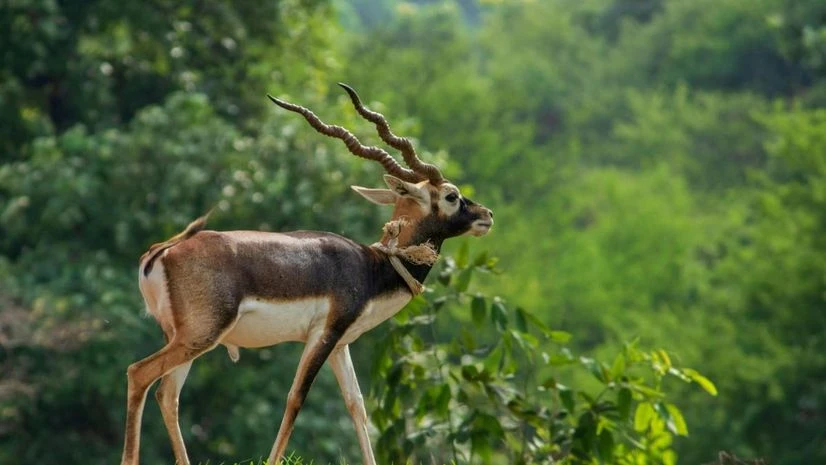The ghost of a 1998 blackbuck poaching case involving Bollywood actor Salman Khan has returned to haunt him, triggered by the murder of Nationalist Congress Party (NCP) leader Baba Siddique.
Salman Khan, a close friend of Siddique, now faces escalating threats, once again highlighting the long-standing controversy surrounding the killing of two blackbucks.
The 1998 blackbuck poaching incident
During the filming of Hum Saath Saath Hain in 1998 near Rajasthan’s Jodhpur, Salman Khan was accused of illegally hunting and killing two blackbucks. This event stirred widespread outrage, particularly among the Bishnoi community, for whom the blackbuck holds sacred significance. The case led to a prolonged legal battle that continues to this day, casting a long shadow over Salman Khan’s public image.
The Bishnoi community, deeply intertwined with the blackbucks and wildlife, led protests against Khan, demanding justice. Their connection to the blackbucks is not merely emotional but also spiritual, as they believe the animals are manifestations of their revered Guru Jambheshwar, who founded the community.
Lawrence Bishnoi’s oath of revenge
Although just a child at the time of the poaching incident, gangster Lawrence Bishnoi has since become a central figure in the ongoing controversy. Bishnoi has repeatedly threatened Salman Khan, vowing to take revenge for the actor’s actions.
Also Read
While some question if his motivations stem from genuine outrage over the poaching or are part of a broader attempt to bolster his criminal image, the blackbuck case remains at the heart of his hostility.
The Bishnoi community's timeless bond with blackbucks
The Bishnoi community’s fierce commitment to wildlife conservation stretches back over 550 years, following the teachings of their founder, Guru Jambheshwar. Protecting animals, especially blackbucks and chinkaras, and preserving vegetation are not just principles of the Bishnoi faith but life-defining duties. The blackbuck, considered a reincarnation of their spiritual leader, is revered as sacred, and any harm to it is seen as an affront to the community’s beliefs.
As Ram Swarup, a Bishnoi community member, shared in a 2018 interview with India Today, “Our community has set a great example in the Salman Khan case. Our women nurture abandoned blackbuck fawns like their babies.” This profound bond with blackbucks is deeply rooted in folklore and spiritual tradition, where the community’s entire existence revolves around the protection of these animals.
Sacrifices of the Bishnoi community for blackbuck conservation
The Bishnoi community’s dedication to wildlife and environmental preservation has led to acts of heroism and sacrifice. In 1730, 362 Bishnois were massacred in Rajasthan’s Khejarli village while attempting to prevent the felling of sacred trees by the orders of Maharaja Abhai Singh. Led by a woman named Amrita Devi, the Bishnois chose death over allowing the destruction of the Khejri trees, a story often cited as a precursor to India’s famous Chipko movement.
Similarly, conservationist Anil Bishnoi, credited with saving over 10,000 blackbucks and chinkaras, once faced a life-threatening situation while trying to stop a hunter from killing five blackbucks. His determination to risk his own life for the sake of these animals highlights the community’s unyielding commitment to their cause.
The Bishnoi way of life: Coexisting with nature
The Bishnois’ relationship with blackbucks and chinkaras goes beyond religious duty — it is an integral part of their daily life. The community ensures that these animals, particularly in the Thar Desert, are cared for and protected. As noted by historian Vinay Lal in his research paper for the University of California, Los Angeles, Bishnoi villages are described as “oases in the desert,” where deer roam freely and millet and water are stored to help them survive droughts.
Bishnoi women, known for their nurturing roles, often breastfeed orphaned blackbuck fawns, further demonstrating the deep connection between the community and wildlife. This centuries-old tradition of coexistence forms the backbone of Bishnoi culture.
Salman Khan case: A test of time and faith
Despite the ongoing legal battle surrounding the 1998 poaching case, the Bishnoi community remains steadfast in its pursuit of justice. For them, the case represents more than just a celebrity trial — it is a matter of honour, faith, and duty to protect the natural world.
While Lawrence Bishnoi’s threats of violence against Salman Khan add a volatile layer to the situation, the Bishnois continue to seek legal recourse to uphold their ideals. In contrast to the gangster’s methods, the community’s quiet but relentless commitment to the preservation of blackbucks and the environment has withstood the test of time.

)